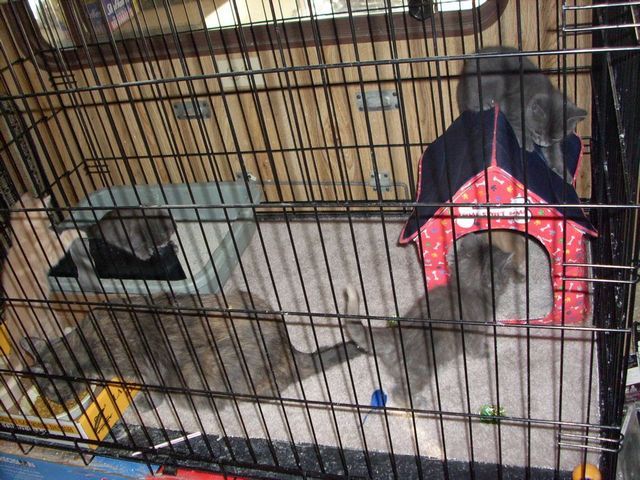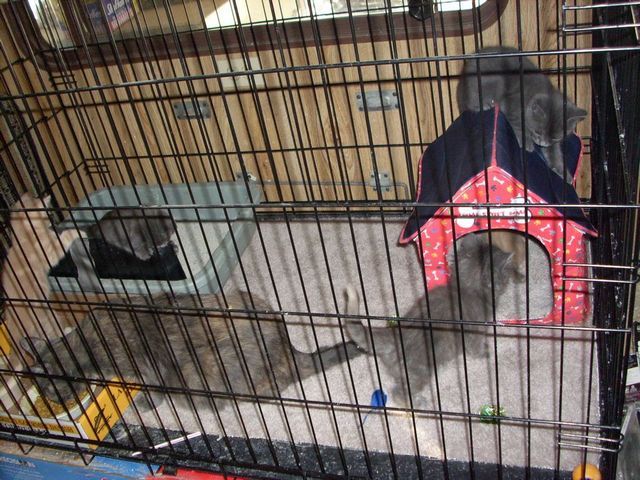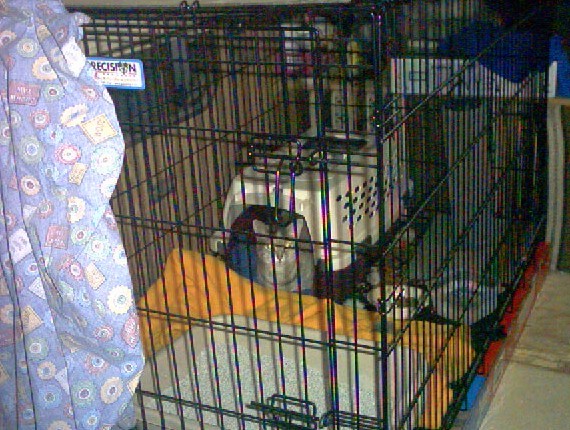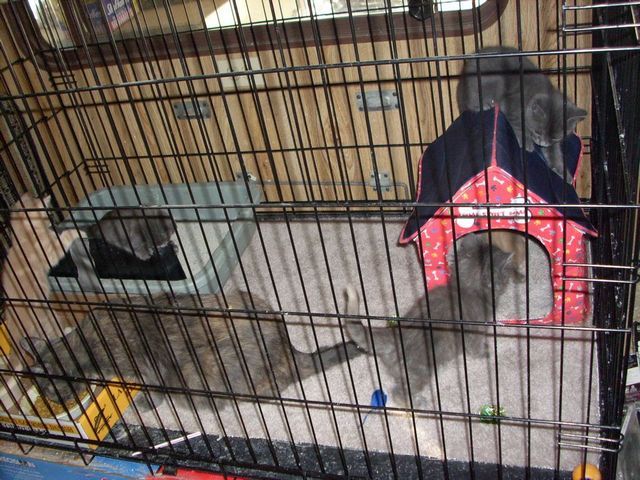Question8/26 - Two weeks ago I took in 2 female kittens from the same liter born around 6/1. Their mother was a feral cat so they've only been around people for around 3 weeks now. They are best of friends. That's the problem. They play and sleep together and hide whenever I approach them. Over time I assume they will get a bit more friendly with me. However, because I have 2 I worry that they will never bond with me like my former cat who lived with me for 18 1/2 years. I have a friend with 4 young children who is willing to take one fo the kittens. Would 1 kitten bond better with me vs having 2 litter mates?
AnswerWilliam,
NO! Do NOT give a feral kitten to someone with small children!
Ferals take special handling and a LOT of patience. They are not like domesticated housecats (like your former cat probably was) and they will not behave or act like one. They are born with an inbred and inherited distrust of humans, but they will bond and trust other animals. Ferals need and understanding of the way they are and a lot of time to learn to trust.
They should not be separated. Kittens need each other for comfort, security, and companionship. And if one is braver than the other, then the other one will learn from watching.
Feral cats can be loving but they DO NOT like to be petted alot or held. When you can pet them, do it only briefly. They do not like it for very long. To protect yourself from bites or scratches you need to watch the feral closely. They will give you warnings when they have had enough petting or touching. Ears will pin back, they may growl, but the main sign is their tail. If it starts twitching or swishing back and forth, the time to stop petting them is....NOW! When you have a feral that doesn't like to be touched....don't. Respect how the cat is and accept it. It will make for a happier living situation.
They are quick to swat at you also until they completely are trusting of you. Do not come at them with your hand from the front to pet them, that can get you swatted. They swat first and think after. It's the self-preservation in them. Always pet from behind the head. Shoulder blades are a favorite pet spot for them. Do not stare at them directly in the eye, that is a threatening gesture. You can look them in the eye only if you slowly blink your eyes at them, or look away. That is a sign of being a friend and not foe...a friendly gesture.
You need to be careful about the tone of your voice with them. NEVER yell at them...and NEVER hit them. They are VERY sensitive and it is VERY easy to undo any progress you have made. When that happens it is VERY difficult to gain their trust again if you lose it. Their trust of humans is fragile. Training them is easier though because of the voice control. They immediately know what you don't like and won't accept by the tone of your voice.
Food is the key to taming. It also associates you with something pleasant. Treats like tuna, tinned sardines with oil, pieces of raw beef, etc. are favorites. Especially something they can easily grab and run with if necessary. The kittens may hesitate to eat in your presence at first, but be patient. Put their food out then sit back quietly, speaking gently to them. Keep moving the food closer to you over a period of time until the food is right next to you and they trust you enough to eat it.
Then you can start touching. Be careful of making sudden moves....remember they are very skittish. How soon you begin handling the kitten depends on the kitten. The more often kittens are handled, the more likely they are to be socialized. Feral kittens will hiss, growl, and swat. Do not be deterred. Also the kittens can have different fathers (even from the same litter) so they may not all act or behave the same.
Healthy ferals kittens are playful. They are also hunters and enjoy being able to do it. They are happiest being able to be an indoor/outdoor cats when they are older. They will instinctively chase a string. Giving them a raw beef rib bone periodically as a treat (I have the butcher cut them in half) satisfies the "fresh kill' instinct, plus the fibers help clean their teeth. You should give them things to 'hunt' as they get older...like stuffed toy mice, little crafts balls that you can throw (ALL my feral kittens 'retrieve' when I throw them), or a pet laser light (from Petco, PetSmart, etc.) so they can chase the little red 'bug' on the ground. It is funny to watch them, it is a great interactive toy between you and the kittens because you can play with them without physical contact which will help them develop trust, and it helps you bond with them.
Ferals usually bond to one person. The cat may loving with you (at times), but will probably ALWAYS be skittish and nervous with other people, and will more than likely hide when they hears people or noises. It is instinctive with them. One of my feral kittens who I have had since birth and is now 2 will hide under the bed for hours if she hears a strange noise or sees people. That is normal feral behavior.
Spay or Neuter them as soon as you can. I have had kittens spayed and neutered at the SPCA as young as 8-10 weeks. That will help their behavior alot.
For some additional feral behavior information go to this link and click on the feral articles:
http://petplacestation.com/articles/?tag=carol-jacobi
I hope this gives you some insight on how to work with feral kittens. The more time you are around them the better. Some ferals don't ever trust humans and can not be tamed, but you have their age in your favor when they are young. Ferals take a lot of time, patience, and love to overcome their natural fear of humans...but the end result is heartwarming. Just take your time with them.
Tabbi

 tabby aggressive
QuestionHi,my male cat jasper is 7 years of age and has
tabby aggressive
QuestionHi,my male cat jasper is 7 years of age and has
 New Kitten
QuestionCat litter in kitchen
QUESTION: I adopte
New Kitten
QuestionCat litter in kitchen
QUESTION: I adopte
 Rescued declawed cat (abandoned?)
QuestionQUESTION: Dear Tabby,
Just r
Rescued declawed cat (abandoned?)
QuestionQUESTION: Dear Tabby,
Just r
 Angry kitten
QuestionI just adopted a young cat. Shes very young, an
Angry kitten
QuestionI just adopted a young cat. Shes very young, an
 Cats behaviour
QuestionHi my parents bought a male ragdoll cat who is
Cats behaviour
QuestionHi my parents bought a male ragdoll cat who is